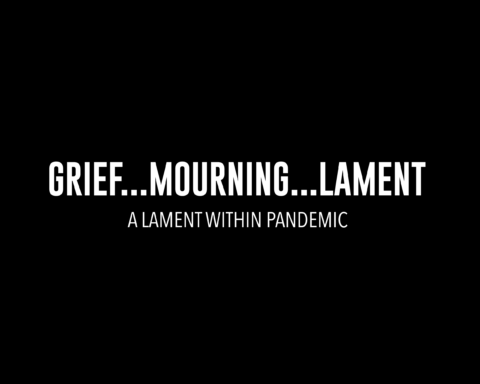Putting the ‘Movement’ Back in Ecumenical Movement

“God of life, lead us to justice and peace.”
In 2012 the World Council of Churches (WCC) met in Greece, and the following year their assembly was held in Busan, South Korea. The theme above was the guiding message for both gatherings, the first WCC theme in the form of a prayer.
I believe that this is incredibly appropriate, for the ecumenical movement begins and ends with prayer (see John 17:21). The enduring practice of the ecumenical movement is rooted in spirituality. We pray in our daily lives. Our communities share prayer lists. In my denominational tradition, during the prayers of the people, the pastor asks members of the congregation to name aloud of silently people and places in need of prayer.
Our prayer is not only with our heads bowed, and hands clasped together; our prayers are with our eyes open, our hands clasped with our neighbors. The Christian life is not just a spiritual one, but also a bodily one, an affirmation of our whole selves. Our action is part of our prayer; we have to get our hands dirty.
___________________________________________
The call of the ecumenical movement is in the name itself: to move.
___________________________________________
Our spiritual life begins with prayer, but it does not stop in the sanctuary. The Greek word for mission, exapostole, means ‘to send’. Christ sends us into the world, with the abiding presence of the Holy Spirit, to move. The call of the ecumenical movement is in the name itself: to move.

I have always preferred the term ‘ecumenical movement’ to ‘ecumenism’. I’m far less interested in the study of uniting than I am in authentic movement toward unity. Ecumenism is the principle of promoting unity among Christians. There are plenty of books, articles, classes, and studies of ecumenism. But a movement is not a study of something; it is the action itself. The ecumenical movement, at its best, is an open space for dialogue about what needs to be changed, how to do it, and where to start.
I have long had a passion for this ecumenical movement I am describing. I participated in the World Council of Churches Central Committee Meeting as a Steward in 2012 and in the WCC General Assembly in Busan as a GETI (Global Ecumenical Theological Institute) student in 2014. Most recently, I spent the last year working with the World Communion of Reformed Churches under the direction of Dora Arce-Valentin, Executive Secretary for Justice and Partnership, and Phil Tanis, Executive Secretary for Communications. Working mainly on the issues of human trafficking and gender justice, I was privileged to meet numerous people from around the world.
___________________________________________
If we are to take the ecumenical movement seriously, our concept of who we are and who we are called to be must change. We must not to be the first to speak; we must rather empower those who have been overlooked or forcibly silenced to lift up their voices.
___________________________________________
My experience with global ecumenical Christianity has left me convicted that mainline denominations like the one I serve have much to learn from the ecumenical movement around the world.
First, we must learn to correct our misguided assumptions about success, power, and wealth.

Photo: Joanna Hipp
The ecumenical movement has done well – better than most mainline churches on their own – at being with the margins. The World Council of Churches document Together Towards Life (TTF) reflects that. Mission not to take place simply at the margins, but with the margins. In my context of U.S. Christianity, this affirmation is countercultural. We are used being the ones with power, who carry out our mission at or to the margins. With is a new, and sometimes threatening, concept. If we are to take the ecumenical movement seriously, our concept of who we are and who we are called to be must change. We must remember to take a step back, not to be the first to speak, but rather to empower those who have been overlooked or forcibly silenced to lift up their voices. This paradigm shift is not only a policy of mission and evangelism; it is a re-working of how we view the Other, and perhaps a shift to where the Other becomes the Neighbor.
Two-thirds of Christians live in the Global South. This means that the West, specifically the United States, despite our disproportionate influence and excessive wealth, represents a minority in the Church universal.
___________________________________________
If the church is going to reach and serve the poor, the church must be poor. Only a poor Church can serve the God who came into the world as a poor child and lived life among the poor.
___________________________________________
If the church is going to reach and serve the poor, the church must be poor. Only a poor Church can serve the God who came into the world as a poor child and lived life among the poor.

Photo: Joanna Hipp
This is important for those of us in the West to hear. The Church that we know is in decline, and many of our beloved congregations are closing their doors. And yet the Church universal thrives. We must learn to be poor. Personal financial wealth cannot be our utmost concern; instead we must look to the needs and well-being of all of humankind. Our security will not be found in the four walls of a sanctuary. In the West, we have become so focused on the building that we have forgotten that church can happen anywhere two or three are gathered. The sacred is not the building; the sacred is around and within us. Anywhere our feet touch is sacred, for we have gathered in God’s name.
And yet we fear. We fear that we will lose our churches, or other things we hold dear and call ‘sacred’. In our fear, we let our capitalistic society in the Global West define our understanding of church. We are lured into believing that ‘successful’ churches are the ones with the most money and resources; and yet God calls the Church to eschew worldly success, to spend more on mission and outreach than building upkeep. The church that builds a Christian Life Center to host homeless women rather than a new sanctuary is a successful church. The church that has members going out and lobbying for education reform, that is a successful church.
___________________________________________
In our fear, we let our capitalistic society define our understanding of church. We are lured into believing that ‘successful’ churches are the ones with the most money and resources.
___________________________________________
A second lesson that U.S. mainline churches can learn from the global ecumenical movement is how to faithfully disagree.

The church is reformed and always reforming, meaning we will never agree on every issue. Division, strange as it may sound, may be part of our calling to represent the diversity of the body of Christ. However, we are also called is to break bread together, to share in the sacred communal meal. And when we construct our own barriers, when we build walls (real and metaphorical) to divide ourselves, we have failed to be the Body of Christ.
However, oftentimes in our quest to be ecumenical – to be, we lose the very flavor of diversity and creative tension that the ecumenical movement provides us. We forget that to be ecumenical does not mean we agree on everything. The ecumenical movement is about unity, not uniformity. Christ never called us to homogeneity.
Just like our misguided conceptions of success, this forced homogeneity and uniformity incite fear. Often this fear leads to even deeper division, as we fortify the walls that divide us. Our congregations become segregated from one another. Even when we are involved in community outreach and work in and with the global world, our ecumenical vision is suspended on Sunday morning. We preach the inclusivity, but we do not live it on Sundays. Our congregations are our congregations. Our way of worship is the way. And the ecumenical passion is lost.
___________________________________________
We don’t have to settle for ‘slot machine Christianity’, where we yell that our fruit matches and we win massive amounts of money, followers, etc.
___________________________________________
We don’t have to settle for ‘slot machine Christianity’, where we yell that our fruit matches and we win massive amounts of money, followers, etc. Sometimes our fruit simply does not match up. There are days when our work and efforts are not enough. Some conversations or efforts end in an impasse. Sometimes we fail.

Photo: Joanna Hipp
However, we must remember our work is not of ourselves, but of God. We work to glorify God, and in doing so, we work to not be the voice for “the least of these,” but to empower their voices above the privileged. We do not pray for our unity, but God’s unity: meaning that our ecumenical calling does not begin or end with us, but with the hopeful unity of all persons.
I began this article with a discussion of prayer, of how our spiritual lives and bodily beings are inextricably intertwined. We cannot separate being religious from being spiritual. I hope that as we continue to progress ecumenically on cultural issues (such as the Black Lives Matter movement, eco-justice, gender justice, etc.) that we will not neglect our shared spirituality. I pray that as we gather together to protest and to stand up for the lives of all human beings, we will continue to gather together in worship, Bible study, and prayer.
___________________________________________
I pray that as we gather together to protest and to stand up for the lives of all human beings, we will continue to gather together in worship, Bible study, and prayer.
___________________________________________

Photo: Joanna Hipp
So, I end in prayer that our work and lives may be rooted in the mission of God and our calling as the Church. I pray for God’s kin-dom to prosper, for our bodies to be the movement, for voices long silenced to be heard, and for all to be invited to table.
Ultimately, my hope for the ecumenical movement is that we practice it enough that the term becomes obsolete, for it is simply our normal practice. May the God of all life continue to lead us to justice and peace.
*****
AUTHOR BIO: Rev. Joanna Hipp holds an MDiv from Louisville Presbyterian Theological Seminary. She spent the past year working with the World Communion of Reformed Churches, specifically in justice related work, mainly human trafficking and gender justice. She is now the Associate Pastor of Youth and Missions at Providence Presbyterian Church in Charlotte, North Carolina.





Unbound Social